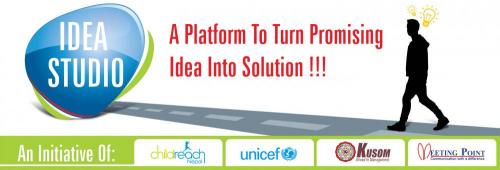
The announcement, by a consortium of organizations comprising UNICEF, ChildReach Nepal, Kathmandu University School of Management to launch Idea Studio, an open competition promoting social innovation and out of the box solutions, is really welcome
The initiative offers an easy way for individuals to showcase their ideas and take part in a competitive selection process that will also include a TV based pitching where the contenders will have to “sell” their ideas to a panel of judges.
The most interesting aspect of the competition is the fact that the best pitches will be “nourished” by mentors, including MBA students, offering the winners advice and inputs that will help them also to raise the necessary startup capital that is indispensable to “pilot” their initiative.
Idea Studio is a powerful platform capable to reach promising individuals that have plenty of ideas but lack the adequate support to groom them.
To me a very interesting thing is that a big player like UNICEF is behind the project. This could be a real game changer in the way development is practiced in the country.
Just imagine if the EU would introduce the same easy application format being used by Idea Studio instead of that no sense of format so far used. Even when the EU asks you to fill a “simple” 4 page concept note, now basically its standard practice, you feel overwhelmed by the questions and complexities of the task.
I guess that it is not just me feeling that bidding for an EU project is almost rocket science. It is not impossible by the way but you need lots of work and practice but it definitely is not very accessible nor inclusive. Moreover I would not suggest any start up to go for it; too complicated, too much of work of course you can always give a try but be careful about the “side” effects.
Instead Idea Studio is at the opposite side of the equation: it is easy, quick to understand and very much user friendly.
This is the best way to encourage a new type of social and civic entrepreneurship, making sure that ideas that have the potential to be trailblazers in their respective sectors can have a real platform to get exposure, feedback and potentially, a fast track pathway for testing and piloting.
Testing and piloting are really key: ultimately you will never know if an idea can really work unless you find a way to experiment, trying it out and, very importantly, you realize that the chances of failing are high and there is nothing wrong with it. This is what happens with real entrepreneurs that oftentimes, before “making it”, have to face a series of “constructive” failures. Despite this, they keep trying till they find the right “alchemy”.
The same is for social innovation: it is all about new approaches that before going on scale are tested. It seems it is working.
That’s why all over the world the field of social innovation is gaining more and more popularity by borrowing techniques and approaches from technical sciences including design. Design thinking is one of the many ways that allows you to first come up with a prototype, a pilot that you test through simulations. The ISO concept of continuous quality improvement allowing you to adjust and improve your project by incorporating lessons learned is a pillar to any attempt to socially innovate.
I know that all this might seems highly theoretical. After all you are taught to be “logical’ when you draw a log frame with pre-determined indicators.
Hopefully Idea Studio can be a real front runner in a wider web of incoming initiatives. USAID, DFID are best positioned to follow through with similar iniatives. Who knows even the EU might come along eventually.
Idea Studio has the potential to kick off a domino effect in the development sector.
After all I think Idea Studio itself is just a first step, a sort of mini initiative, a sort of prototype to be tested before being scaled up.
Kudos to Unicef for supporting the initiative.










Add new comment